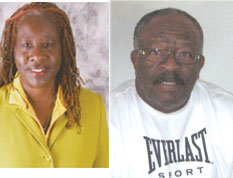
Religious beliefs lend a bit of theological intrigue to politics
THOMAS
REASER
By Derek Joy
An overwhelming majority of the American citizenry profess devout beliefs in Christianity as a matter of religious practice.
Absent recognized authorities on the other world religions, there can be no assertion that theirs holds the theological premise equal to the Christian belief that “God works in mysterious ways.”
Hence, a timely question arises on the heels of Decision 2012, in which President Barack Obama and Vice President Joe Biden delivered a knockout blow to Republican challengers Mitt Romney and Paul Ryan.
Consequently, it seems to be a fair question to ask: Was Hurricane Sandy, dubbed the Super Storm, when it hit the eastern United States, a worldly example of how God works in mysterious ways?
“I would never see it as God sent that storm for that purpose,” said Sis. Arneatha Thomas, a faithful congregational member of the Spirit of Christ Ministries, Rev. Cecil Lamb, pastor. “It’s all about the mysteries of God. His works are beyond our understanding.
“He allowed that to happen,” added Thomas, who recently self published a book titled Power of the Blood at Work – Broken Veil, detailing how life’s circumstances are overcome through the application of scriptures.
“Because of that it allowed people to come together. For instance, New Jersey Gov. Chris Christie met with President Obama when he visited New Jersey after the storm. New York Mayor Michael Blumberg endorsed President Obama after the storm hit.”
Fact is, Christie, who spoke at the GOP National Convention when Romney officially accepted his party’s Presidential Nomination, repeatedly attacked and denounced President Barack Obama.
Blumberg, a Democrat, had not endorsed President Obama, until the President visited New York to assess the damage caused by the Super Storm.
Surely one could question the link between the natural disaster and God’s way of working in mysterious ways. Scientific explanations offer sufficient answers beyond the religious or theological perceptions.
Still, the timing was as a bolt of lightning striking at the core of opposition to President Obama’s repeated calls for rebuilding the nation’s infrastructures.
“They (Republicans) knew all this, but they just didn’t want him (President Obama) to be the one to bring it to the table and get credit for it,” said Fred Reaser, a retired letter carrier for the U. S. Postal Ser-vice.
“No. They were not going to let a Black man come and straighten out the mess they made. They were going to get in office and do all the things Obama wanted to do and take credit for turning the economy around.”
President Obama and Vice President Joe Biden steamrolled the GOP standard bearers of Romney and Ryan much like Hurricane Sandy the Super Storm swept the east coast.
Hence, any and all speculation of what Romney and the GOP would have done or attempted to do became a moot point.
“Here it is these jokers (Romney and Ryan) talking about winning and couldn’t win their own states,” said Charles Cutler, a community activist and a member of New Birth Cathedral of Faith. “How are you going to win the country when you can’t even win your home state?”
Cutler’s comment addressed Obama’s victories in Massachusetts and Wisconsin, the home states of Romney and Ryan, respectively.
Then he considered the religious and theological possibilities.
“That was a prophetic message,” he said, noting the timing and impacts of Hurricane Sandy. “The damage was caused by an aging infrastructure. The infrastructure just got old.
“We should be rebuilding the infrastructure instead of spending all that money in other countries. Why pay people to hate us and kill your military personnel? Spend that money at home and put people to work.”
Ironically, President Obama’s efforts to do just that were always met with unrelenting opposition.
Hurricane Sandy wreaked enough havoc to weaken any arguments against rebuilding the nation’s infrastructures. If nothing else, the need has become painfully obvious.
“That’s possible,” said Barbara Felder, a Christian believer, who considered the link between God’s mysterious ways and the timing of Hurricane Sandy. “Somebody else said that to me just before the election. But I’m not God.”
Sister Emma Lassiter, a long time member of St. Mark M.B. Church, said, “I kinda think it happened for a reason. People don’t realize that when destruction comes it happens for a reason, just like New Orleans.”
Aging levies collapsed not because of Hurricane Katrina, but because of the following storm surge.
Again, aging infrastructures were exposed by a natural disaster. America’s east coast remains in disarray as residents suffer the consequences.
Whether or not such destruction, at a time when President Obama sought re-election, lends credence or confirmation to the premise that “God works in mysterious ways,” is open to debate.
